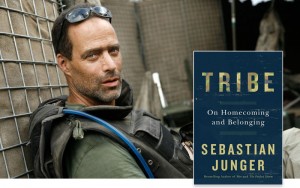Junger ’84 Discusses Tribe on NPR

On his website, Sebastian Junger ’84 writes that his latest book, Tribe: On Homecoming and Belonging (Twelve, May 24, 2016), is “about why tribal sentiment is such a rare and precious thing in modern society, and how the lack of it has affected us all. It’s about what we can learn from tribal societies about loyalty and belonging and the eternal human quest for meaning. … Humans don’t mind duress, in fact they thrive on it. What they mind is not feeling necessary.”
On May 21, Scott Simon, host of NPR’s Weekend Edition Saturday, invited Junger to discuss the origin and thesis behind Tribe.The two journalists had both spent time in Sarajevo in 1993–94 during the siege and shared recollections of a young woman, who had been a teen then and is a journalist in Bosnia now.
Simon asked Junger to recall a recent conversation with that journalist in Bosnia, which illustrated an unexpected emotional response to the current peace in the region. “[S]he said, we were better people during the siege. We helped each other. We lived more closely. We would have died for each other. And now.., we’re a wealthy society. And everyone just lives for themselves. And everyone’s depressed….”
Simon also noted the discomfort Junger feels with the term PTSD.
“Well, it has its use,” Junger acknowledged. “It describes a long-term reactions to trauma that some people get.” However, he noted the discrepancy between the relatively low numbers of soldiers who see combat, versus the high percentage who seek help under that tag.
That fact prompted Junger to use his Wesleyan anthropology major—with fieldwork on the Navajo Reservation—as a lens. “I bet the Navajo, the Apache, the Comanche, the Cheyenne, the Sioux, the Kiowa—very, very warlike societies…weren’t getting PTSD,” he hypothesized. Perhaps the society to which the warrior returns is a key factor in the ease of transition from battlefield to home. “And if you come home to a cohesive tribal society, maybe you recover quite quickly from trauma.”
“I think psychological counseling is very important for people who have been traumatized,” he told Simon. “But what do you do with the people who weren’t traumatized, who don’t feel like they should be home? They no longer feel like they belong to the society they fought for.”

